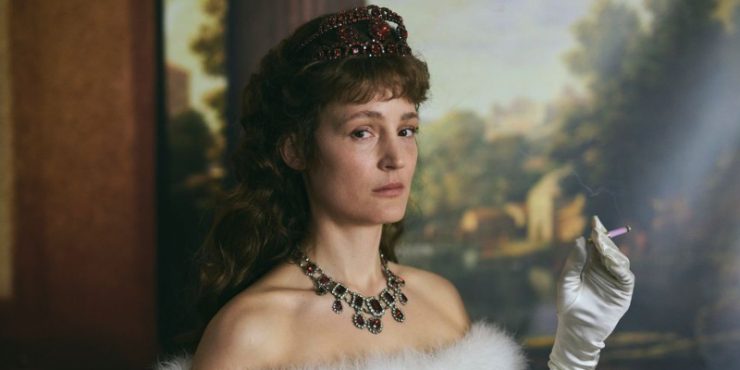We all know what to expect of a royal biopic. The vast, sweeping palaces. Complex, ornate clothing. Rigid interiority thinly veiling robust emotion. Whether by design or by necessity of a limited budget, Corsage sidesteps a lot of the grandiosity, preferring an intimate portrayal of Empress Elisabeth of Austria. Elisabeth, or Sisi, was a beloved figure within the Habsburg Empire. Walking the streets of Vienna today, you’re awash in statues and portraits bearing her likeness. Wife of Emperor Franz Joseph I, she won the heart of the masses with her otherworldly beauty and uncommon spirit. Her refusal to live within the strict confines of the Habsburg court made her a symbol of strength, a larger-than-life woman whose nobility belied a troubled reality of rebellion.
Vicky Krieps plays Elisabeth. The Luxembourgish actor is also listed as an executive producer, her first producing credit. Her two performances in 2017’s Phantom Thread and last year’s Bergman Island centered two contemporary masterpieces, breathing humanity into characters that were complex but also largely conflicted women in love with great artists. In Corsage, she has no male love interest to placate. The men in the film are there to either serve her or be defeated by her strength of will. Writer-director Marie Kreutzer (who worked with Krieps before in 2016’s We Used to Be Cool) places Krieps in the center of the universe, breaking the barrier between queen and subject, giving us a candid audience with Sisi like we’ve never seen before.
Kreutzer’s film does not make itself beholden to historical record, focusing instead on Elisabeth’s persistent attempts to feel vital within the confines of her position. Most of the events take place in 1878, as the Habsburg empire faces the existential drama of a crumbling realm. Corsage doesn’t delve too deeply into matters of state, though the lack of ornate furniture and priceless decoration speaks for itself. Elisabeth, approaching forty, can feel her soul being sucked out by the strict responsibility of her position and her loveless marriage to Franz Joseph (Florian Teichtmeister). Her youngest daughter, Valerie (Rosa Hajjaj), struggles with her mother’s impropriety, while her only son, Rudolf (Aaron Friesz), mostly lets her behave as she wishes. What’s clear is that no one can claim to control or dictate her actions.
Elisabeth really only enjoys herself when riding her horse or when in the company of men who are not the emperor. This includes her cousin, Ludwig (Manuel Rubey), the king of Bavaria (and fiancé of Elisabeth’s younger sister), as well as Bay (Colin Morgan), a horse trainer who shares Elisabeth’s fondness for riding. By the time of the events in the film, the emperor has long given up trying to wrangle his wife, but the public displays of disdain still irk him and their children. At the mere mention of discipline, Elisabeth further entrenches herself, petulantly refusing to bend to expectations. Surrounded by a stable of dressers, valets, and ladies-in-waiting, Elisabeth lashes out against those who do not approve of her choices – and when they do approve, she lashes out any way, for good measure.
Kreutzer and Krieps put little effort in making Elisabeth sympathetic. The charm of her ungovernability can sometimes spill into a cruelty against those beneath her. This is best represented by her relationship with her main lady-in-waiting, Marie (Katharina Lorenz), whom she adores but keeps encased in a sterile life of servitude. The irony of the arrangement ends up lost on her. In an early scene, Elisabeth visits an asylum, where she greets patients and speaks to doctors regarding the upkeep of the institution. When she sees the woman’s ward, she becomes flush with emotion. A doctor coldly states that they are afflicted with a “natural” state of melancholy. Some of the women even have their wrists and ankles bound to their beds. Even separated by a vast chasm of class and privilege, glimpsing at them, the empress empathizes completely and sees herself as a prisoner in her own life.
Corsage may remind many of Sofia Coppola’s Marie Antoinette, not only because it sets its period tale to a soundtrack of contemporary pop songs, but also because it chooses to show a queen deep in a life of luxury struggling with the restraints that comes with that luxury. Where Antoinette dwelled in its extravagances, Corsage instead emphasizes the desolation, tightening its focus on Elisabeth and her erratic, sometimes contradictory, behavior. Driven mad by society rumors about her weight, appearance, as well as her supposed adulterous infractions, she alienates those closest to her in vain attempts to regain what little agency she has. Kreutzer’s fictional, impressionistic take on the historical biopic has feet in both classical and modern storytelling, giving Corsage some much needed exuberance without dispatching the magisterial nature of a royal drama.
With cinematographer Judith Kaufmann, Kreutzer gives this period piece the epic treatment, even if it doesn’t have the resources of a larger Hollywood costume drama. If anything, Kreutzer uses the limitations to her advantage, enhancing the movie’s sense of morose solitude. This is though, more than anything, a showcase for Krieps, who continues her streak of brilliant leading performances (perhaps a good time to say I never saw M. Night Shyamalan’s Old, so take with that what you will). Her Elisabeth is a phenomenal reconstruction, a fierce and funny performance that never begs for audience approval. In her hands, the empress is tender but impatient, stubborn but vulnerable. Refusing to play by the rules set before her, it recalls her performance in Phantom Thread, but not even in Thread was she meant to carry every single scene like she does here. Many of us already knew Krieps was a star, but Corsage should convince anyone still on the fence.
Written and Directed by Marie Kreutzer










